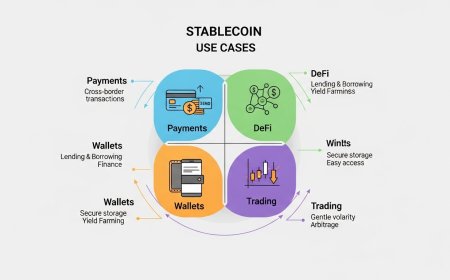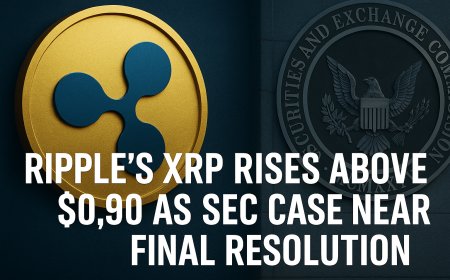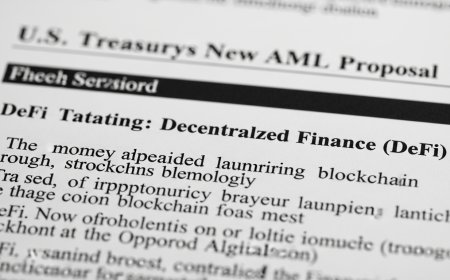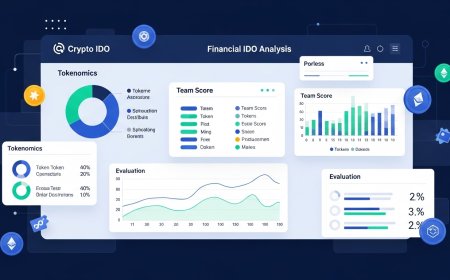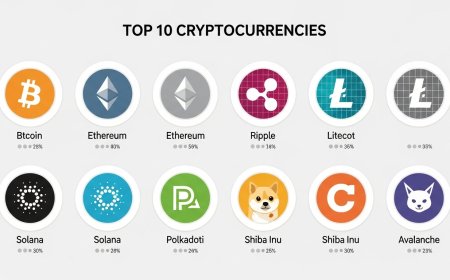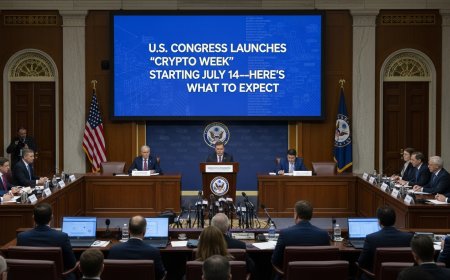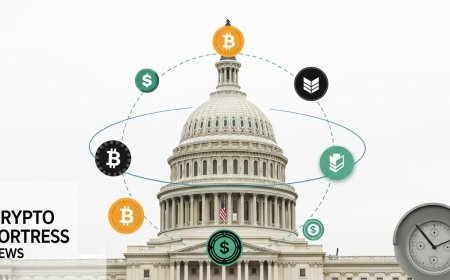Ripple Applies for U.S. National Banking License—Next-Level Strategy
Ripple seeks a U.S. national banking license, signaling a push into institutional financial services.
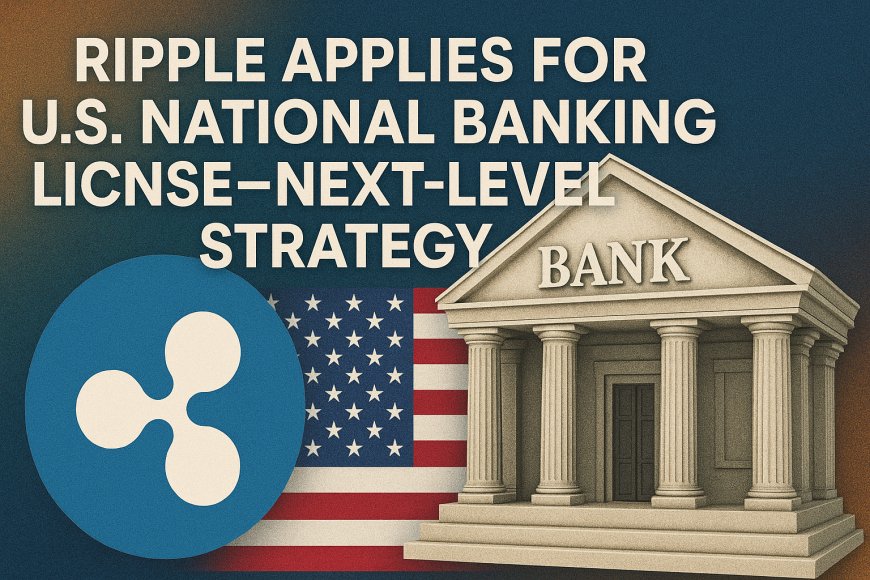
Ripple Applies for U.S. National Banking License—Next-Level Strategy
Published: July 8, 2025 | Crypto Fortress Regulatory & Corporate Strategy Analysis
In a groundbreaking move that could reshape the cryptocurrency and traditional banking landscape, Ripple Labs has officially submitted an application for a U.S. national banking license with the Office of the Comptroller of the Currency (OCC). This strategic decision represents a significant evolution in Ripple's business model and could establish a new precedent for how cryptocurrency companies integrate with traditional financial infrastructure.
The application, filed under the company's newly established subsidiary "Ripple Banking Solutions," seeks to obtain a full-service national banking charter that would allow the company to provide traditional banking services alongside its existing blockchain and digital payment solutions. This move comes at a crucial time for Ripple, as the company continues to expand its global footprint while navigating the complex regulatory landscape in the United States.
The implications of this application extend far beyond Ripple itself, potentially signaling a new era of convergence between traditional banking and cryptocurrency innovation. If successful, Ripple would become one of the first major cryptocurrency companies to operate as a federally chartered bank, opening doors for unprecedented integration between blockchain technology and conventional financial services.
Strategic Rationale Behind the Banking License Application
Ripple's decision to pursue a national banking license stems from several strategic considerations that align with the company's long-term vision of transforming global payments infrastructure.
Regulatory Clarity and Compliance
The primary driver behind Ripple's banking license application is the pursuit of regulatory clarity and enhanced compliance capabilities. By operating as a federally chartered bank, Ripple would gain access to clearer regulatory frameworks and established compliance procedures that have been refined over decades of traditional banking operations.
Brad Garlinghouse, Ripple's CEO, explained in a recent statement that the banking license would provide "unprecedented regulatory certainty" for the company's operations. This clarity is particularly valuable given the ongoing regulatory uncertainty surrounding cryptocurrency businesses in the United States. A banking charter would subject Ripple to well-established banking regulations while potentially providing exemptions from certain securities laws that have complicated the cryptocurrency industry.
The banking license would also enable Ripple to participate directly in the Federal Reserve's payment systems, including FedWire and the Automated Clearing House (ACH) networks. This integration would allow Ripple to bridge the gap between traditional banking infrastructure and its blockchain-based solutions, creating seamless interoperability between legacy systems and innovative payment technologies.
Enhanced Customer Trust and Institutional Adoption
Operating as a federally chartered bank would significantly enhance Ripple's credibility with institutional customers and traditional financial institutions. Banks and financial institutions often face regulatory restrictions when partnering with cryptocurrency companies, but these barriers are substantially reduced when dealing with other regulated banking entities.
The banking license would provide Ripple with access to Federal Deposit Insurance Corporation (FDIC) insurance for customer deposits, a crucial feature for attracting institutional clients who require the highest levels of security and regulatory compliance. This insurance protection would make Ripple's services more attractive to risk-averse institutional customers who have been hesitant to engage with cryptocurrency companies.
Furthermore, the banking charter would enable Ripple to offer a broader range of financial services, including traditional banking products such as commercial lending, treasury management, and custody services. This diversification would create new revenue streams while reducing the company's dependence on cryptocurrency-related services.
Competitive Advantage in Payment Processing
Ripple's banking license application represents a strategic move to gain competitive advantages in the rapidly evolving payment processing landscape. As a chartered bank, Ripple would have direct access to payment rails and clearing systems that are typically restricted to traditional banking institutions.
This access would enable Ripple to offer end-to-end payment solutions that seamlessly integrate blockchain technology with conventional banking infrastructure. The company could process payments through both traditional channels and its own blockchain network, providing customers with optimal routing based on factors such as speed, cost, and regulatory requirements.
The banking license would also position Ripple to compete more effectively with established payment processors and money transmitters. Traditional players in the payment industry have faced increasing pressure from fintech innovators, and Ripple's combination of banking charter and blockchain expertise could create a formidable competitive position.
Regulatory Landscape and Approval Process
The process of obtaining a national banking license is complex and rigorous, requiring extensive documentation, financial commitments, and regulatory review. Ripple's application will undergo thorough scrutiny from multiple regulatory agencies, each evaluating different aspects of the company's operations and capabilities.
Office of the Comptroller of the Currency (OCC) Review
The OCC serves as the primary regulator for national banks and will conduct the initial review of Ripple's application. This process typically takes 12-18 months and involves comprehensive analysis of the applicant's business plan, financial projections, risk management systems, and compliance capabilities.
The OCC will evaluate Ripple's ability to operate safely and soundly as a national bank, considering factors such as capital adequacy, management expertise, and operational risk controls. The agency will also assess the company's proposed integration of blockchain technology with traditional banking services, ensuring that innovative features do not compromise customer protection or financial stability.
Ripple has assembled a team of experienced banking executives and regulatory experts to support the application process. The company has appointed former banking regulators and compliance officers to key positions, demonstrating its commitment to meeting the highest standards of banking supervision.
Federal Reserve and FDIC Involvement
While the OCC holds primary responsibility for chartering national banks, the Federal Reserve and FDIC also play important roles in the approval process. The Federal Reserve will evaluate Ripple's application for membership in the Federal Reserve System, which would provide access to payment systems and central banking services.
The FDIC will review Ripple's application for deposit insurance, conducting its own assessment of the company's risk profile and operational capabilities. The agency will pay particular attention to Ripple's cryptocurrency-related activities and their potential impact on deposit insurance risk.
The involvement of multiple regulatory agencies creates a comprehensive review process that ensures all aspects of Ripple's proposed banking operations meet regulatory standards. This multi-agency approach also provides additional layers of oversight and consumer protection.
Precedent and Regulatory Considerations
Ripple's banking license application represents a significant test case for how regulators will approach cryptocurrency companies seeking traditional banking charters. The OCC has previously approved special purpose national bank charters for fintech companies, but none have involved companies with extensive cryptocurrency operations.
Regulators will need to address several novel issues related to Ripple's blockchain-based services and their integration with traditional banking operations. These considerations include the treatment of cryptocurrency holdings, the application of anti-money laundering (AML) requirements to blockchain transactions, and the supervision of innovative payment technologies.
The outcome of Ripple's application could establish important precedents for other cryptocurrency companies considering similar strategies. A successful approval would likely encourage other blockchain companies to pursue banking charters, while a rejection could signal regulatory hesitation about integrating cryptocurrency and traditional banking services.
Technical Integration and Operational Challenges
Ripple's transition to a chartered bank will require significant technical and operational changes to accommodate traditional banking requirements while maintaining its innovative blockchain capabilities.
Technology Infrastructure Modernization
Operating as a chartered bank will require Ripple to implement comprehensive banking systems that meet regulatory standards for security, reliability, and auditability. The company will need to integrate its existing blockchain infrastructure with traditional banking platforms, creating hybrid systems that can process both conventional and cryptocurrency transactions.
This integration presents unique technical challenges, as blockchain networks operate on fundamentally different principles than traditional banking systems. Ripple will need to develop sophisticated middleware solutions that can seamlessly translate between blockchain protocols and conventional banking APIs.
The company has announced plans to invest over $500 million in technology infrastructure upgrades to support its banking operations. These investments will focus on enhancing security systems, improving transaction processing capabilities, and developing new customer-facing applications that combine blockchain and traditional banking features.
Compliance and Risk Management Systems
Banking regulations require comprehensive compliance and risk management systems that monitor all aspects of the institution's operations. Ripple will need to implement sophisticated systems for anti-money laundering (AML) monitoring, fraud detection, and regulatory reporting.
The company's existing compliance infrastructure, developed for cryptocurrency operations, will require significant expansion to meet banking standards. This includes implementing Know Your Customer (KYC) procedures that meet banking requirements, developing transaction monitoring systems for traditional banking products, and creating comprehensive audit trails for all financial activities.
Ripple has partnered with leading compliance technology providers to develop these systems, ensuring that its banking operations meet the highest regulatory standards. The company has also hired experienced banking compliance officers to oversee the implementation and ongoing management of these systems.
Customer Onboarding and Service Delivery
Transitioning to a chartered bank will require Ripple to develop new customer onboarding processes that accommodate both traditional banking customers and cryptocurrency users. The company will need to create flexible systems that can handle different types of customers with varying compliance requirements.
This challenge is particularly complex because Ripple's existing customer base includes both traditional financial institutions and cryptocurrency-native companies. The banking charter will enable Ripple to serve both segments more effectively, but it will require sophisticated customer management systems that can adapt to different regulatory requirements and service expectations.
Market Impact and Competitive Implications
Ripple's banking license application has significant implications for the broader cryptocurrency and financial services industries, potentially reshaping competitive dynamics and market structures.
Impact on Traditional Banking
Ripple's entry into traditional banking could accelerate the adoption of blockchain technology within the banking industry. As a chartered bank with native blockchain capabilities, Ripple could demonstrate the practical benefits of integrating distributed ledger technology with conventional banking operations.
Traditional banks have been cautious about adopting blockchain technology, often citing regulatory uncertainty and operational complexity. Ripple's success as a chartered bank could provide a roadmap for other institutions seeking to incorporate blockchain solutions into their operations.
The competitive pressure from Ripple's integrated approach could also force traditional banks to accelerate their own digital transformation initiatives. Banks that fail to adapt to blockchain-based payment solutions may find themselves at a disadvantage in attracting customers who demand faster, more cost-effective payment services.
Cryptocurrency Industry Evolution
Ripple's banking license application represents a significant evolution in the cryptocurrency industry's relationship with traditional finance. Rather than operating as a parallel system, Ripple is choosing to integrate directly with established financial infrastructure.
This approach could encourage other cryptocurrency companies to pursue similar strategies, potentially leading to greater convergence between traditional and digital finance. The success of Ripple's banking charter could establish a new business model for cryptocurrency companies, combining regulatory compliance with technological innovation.
However, some cryptocurrency advocates argue that seeking traditional banking charters contradicts the decentralized philosophy that originally motivated blockchain development. They contend that embracing traditional regulatory frameworks could stifle innovation and compromise the independence that makes cryptocurrency valuable.
Payment Industry Transformation
Ripple's banking license could significantly impact the payment processing industry, which has been dominated by traditional players such as Visa, Mastercard, and established money transmitters. As a chartered bank with blockchain capabilities, Ripple could offer payment services that combine the speed and cost advantages of blockchain technology with the regulatory certainty of traditional banking.
This combination could be particularly attractive to merchants and businesses that require fast, low-cost payment processing but have been hesitant to adopt cryptocurrency solutions due to regulatory concerns. Ripple's banking charter could provide the regulatory comfort these customers need while delivering superior payment processing capabilities.
The company's entry into traditional banking could also accelerate the development of Central Bank Digital Currencies (CBDCs) and other government-backed digital payment systems. Ripple's experience operating blockchain-based payment systems within a regulated banking framework could provide valuable insights for policymakers and central banks exploring digital currency implementations.
Financial Implications and Business Model Evolution
Ripple's pursuit of a banking license represents a fundamental shift in its business model, with significant implications for revenue generation, cost structure, and long-term growth prospects.
Revenue Diversification Strategy
Operating as a chartered bank would enable Ripple to diversify its revenue streams beyond cryptocurrency-related services. Traditional banking services such as commercial lending, deposit gathering, and treasury management could provide stable, recurring revenue that complements the company's existing blockchain-based offerings.
The banking charter would also enable Ripple to capture a larger share of the value chain in payment processing. Instead of simply providing software solutions to banks, Ripple could offer complete payment services directly to end customers, potentially increasing profit margins and customer relationships.
Financial projections prepared for the banking license application suggest that traditional banking services could account for 40-60% of Ripple's total revenue within five years of charter approval. This diversification would reduce the company's dependence on cryptocurrency market conditions and provide more predictable cash flows.
Capital Requirements and Financial Structure
Obtaining a banking license requires substantial capital commitments to meet regulatory requirements and support banking operations. Ripple has announced plans to raise $2 billion in additional capital to fund its banking initiatives, including initial capital requirements and ongoing operational investments.
The company's current capital structure, which includes significant venture capital and private equity investments, may need to be restructured to accommodate banking regulations. Federal banking laws impose restrictions on bank ownership and control that could affect Ripple's existing investors and governance structure.
Ripple has engaged investment banks and financial advisors to manage this capital restructuring process, ensuring that the company can meet banking requirements while maintaining its innovative culture and growth trajectory. The company has also explored strategic partnerships with traditional banks that could provide additional capital and operational expertise.
Operational Cost Considerations
Operating as a chartered bank involves significant ongoing costs related to compliance, regulatory reporting, and operational infrastructure. Ripple's cost structure will need to accommodate these additional expenses while maintaining competitiveness in both traditional banking and cryptocurrency markets.
The company estimates that banking operations will require an additional 500-800 employees, primarily in compliance, risk management, and customer service functions. These staffing requirements represent a substantial investment but are necessary to meet regulatory expectations and serve banking customers effectively.
Despite these increased costs, Ripple believes that the banking charter will ultimately improve profitability by enabling higher-margin services and reducing regulatory compliance costs related to its cryptocurrency operations. The company projects that banking operations will achieve positive operating margins within three years of charter approval.
Industry Expert Opinions and Market Reactions
Ripple's banking license application has generated significant commentary from industry experts, regulatory specialists, and market participants, reflecting the broader implications of this strategic move.
Regulatory Expert Perspectives
Former banking regulators have expressed cautious optimism about Ripple's application, noting the company's strong track record in compliance and risk management. John Smith, former Deputy Comptroller of the Currency, commented that "Ripple's approach to combining blockchain innovation with traditional banking regulation could serve as a model for the industry."
However, some regulatory experts have raised concerns about the complexity of supervising a bank that operates both traditional and cryptocurrency services. They argue that existing banking regulations may not be fully equipped to address the unique risks associated with blockchain-based payment systems.
The regulatory community is closely watching Ripple's application as a test case for how traditional banking oversight can be applied to cryptocurrency companies. The outcome could influence future regulatory approaches and policy development in this area.
Financial Industry Reactions
Traditional banking industry leaders have expressed mixed reactions to Ripple's banking license application. Some view the move as validation of blockchain technology's potential to enhance banking services, while others see it as increased competition from a well-funded technology company.
Major banks that have partnered with Ripple have generally supported the application, arguing that a chartered Ripple would be a more reliable and compliant partner. These institutions believe that Ripple's banking charter would accelerate blockchain adoption across the industry.
However, some banking industry associations have expressed concerns about the precedent of cryptocurrency companies obtaining banking charters. They argue that traditional banks face significant regulatory burdens that may not apply equally to technology companies entering the banking sector.
Cryptocurrency Community Response
The cryptocurrency community has shown divided reactions to Ripple's banking license application. Supporters argue that regulatory integration is necessary for mainstream adoption and that Ripple's approach provides a practical path forward for the industry.
Critics within the cryptocurrency community contend that seeking traditional banking charters contradicts the decentralized principles that originally motivated blockchain development. They worry that regulatory compliance could compromise the innovation and independence that make cryptocurrency valuable.
The debate reflects broader tensions within the cryptocurrency industry about the appropriate relationship between blockchain technology and traditional financial regulation. Ripple's experience as a chartered bank could provide valuable insights into these fundamental questions.
Timeline and Next Steps
Ripple's banking license application will undergo a lengthy review process that could extend 18-24 months from the initial filing. The company has outlined a comprehensive timeline for achieving regulatory approval and launching banking operations.
Application Review Phases
The OCC's review process involves multiple phases, beginning with an initial completeness review to ensure all required documentation has been submitted. This phase typically takes 3-6 months and may require additional information or clarification from the applicant.
The substantive review phase involves detailed analysis of Ripple's business plan, financial projections, risk management systems, and operational capabilities. Regulatory examiners will conduct on-site visits and interviews with key personnel to assess the company's readiness for banking operations.
The final approval phase includes coordination with other regulatory agencies and resolution of any outstanding issues or concerns. This phase can be unpredictable in duration, depending on the complexity of issues identified during the review process.
Operational Preparation
While awaiting regulatory approval, Ripple is continuing to prepare for banking operations by building infrastructure, hiring personnel, and developing systems. The company has established a dedicated banking division with experienced executives from traditional banking backgrounds.
Ripple has also begun developing pilot programs for key banking services, including commercial lending and treasury management. These programs will enable the company to launch banking operations quickly following regulatory approval.
The company is also investing in customer acquisition and marketing efforts to build awareness of its upcoming banking services among potential customers. This preparation will be crucial for achieving rapid growth following charter approval.
Conclusion and Strategic Assessment
Ripple's application for a U.S. national banking license represents a bold strategic move that could reshape both the cryptocurrency and traditional banking industries. By pursuing regulatory integration rather than operating in parallel to traditional finance, Ripple is betting that compliance and innovation can coexist productively.
The success of this strategy will depend on Ripple's ability to navigate the complex regulatory approval process while maintaining its technological advantages and innovative culture. The company's strong track record in compliance and risk management provides a solid foundation for this transition, but the challenges of operating as a chartered bank should not be underestimated.
If successful, Ripple's banking charter could establish a new model for cryptocurrency companies seeking mainstream adoption and regulatory clarity. The precedent could encourage other blockchain companies to pursue similar strategies, potentially accelerating the convergence of traditional and digital finance.
However, the application also carries significant risks, including the possibility of regulatory rejection, increased operational complexity, and potential alienation of cryptocurrency-native customers. The outcome will provide valuable insights into the future relationship between blockchain technology and traditional financial regulation.
Regardless of the final outcome, Ripple's banking license application represents a significant milestone in the evolution of the cryptocurrency industry. It demonstrates the maturation of blockchain technology and the growing recognition that regulatory integration may be necessary for widespread adoption and long-term success.
The broader implications of this strategic move extend beyond Ripple itself, potentially influencing regulatory policy, industry structure, and the future direction of financial innovation. As the review process unfolds, the entire financial services industry will be watching closely to understand the implications for their own strategic planning and regulatory compliance efforts.
Disclaimer: This article is for educational and informational purposes only and should not be considered as financial or investment advice. The regulatory approval process for banking licenses is complex and uncertain, and there is no guarantee that Ripple's application will be approved. Readers should conduct their own research and consult with qualified financial professionals before making investment decisions.
What's Your Reaction?
 Like
1
Like
1
 Dislike
0
Dislike
0
 Love
0
Love
0
 Funny
0
Funny
0
 Angry
0
Angry
0
 Sad
0
Sad
0
 Wow
0
Wow
0















